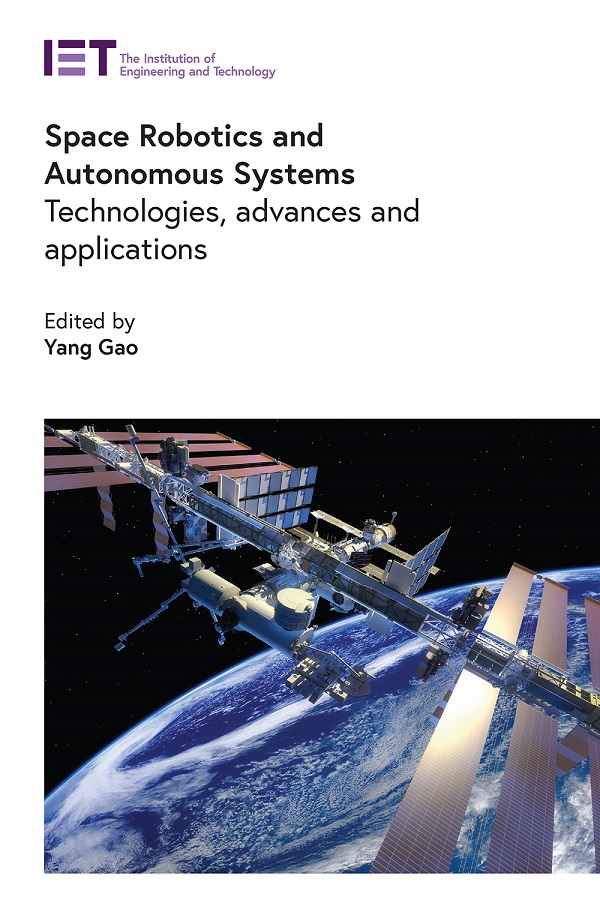- Agricultural Engineering and Technology
- Applied Physics
- Built Environment
- Computing and Networks
- Control, Robotics and Sensors
- Electrical Regulations
- Electromagnetics and Radar
- Energy Engineering
- Healthcare Technologies
- History and Management of Technology
- IET Codes and Guidance
- Manufacturing
- Materials, Circuits and Devices
- Model Forms
- Security
- Telecommunications
- Transportation

Space Robotics and Autonomous Systems
Technologies, advances and applications
Edited by Yang Gao
Space robotics and autonomous systems (Space RAS) play a critical role in the current and future development of mission-defined machines that can survive in space while performing exploration, assembly, construction, maintenance and servicing tasks. They represent a multi-disciplinary emerging field at the intersection of space engineering, terrestrial robotics, computer science and materials. The field is essential to humankind's ability to explore or operate in space; providing greater access beyond human spaceflight limitations in the harsh environment of space, and offering greater operational handling that extends astronauts' capabilities. Space RAS covers all types of robotics for the exploration of planet surfaces as well as robotics used in orbit around the Earth and the sensors needed by the platform for navigation or control.
Written by a team of International experts on space RAS, this book covers advanced research, technologies and applications including: sensing and perception to provide situational awareness for space robotic agents, explorers and assistants; mobility to reach and operate at sites of scientific interest on extra-terrestrial surfaces or free space environments using locomotion; manipulations to make intentional changes in the environment or objects using locomotion such as placing, assembling, digging, trenching, drilling, sampling, grappling and berthing; high-level autonomy for system and sub-systems to provide robust and safe autonomous navigation, rendezvous and docking capabilities and to enable extended-duration operations without human interventions to improve overall performance of human and robotic missions; human-robot interaction and multi-modal interaction; system engineering to provide a framework for understanding and coordinating the complex interactions of robots and achieving the desired system requirements; verification and validation of complex adaptive systems; modelling and simulation; and safety and trust.
About the Editors
Yang Gao is the Professor of Space Autonomous Systems at Surrey Space Centre of the University of Surrey, UK. Prof. Gao founded and heads the multi-awards winning Space Technology for Autonomous and Robotic systems Laboratory (STAR LAB), which specializes in robotic sensing, perception, visual GNC and biomimetic mechanisms for industrial applications in extreme environments. She has been the Principal Investigator of internationally teamed projects funded by UK Research Councils, InnovateUK, Royal Academy of Engineering, European Commission, European Space Agency (ESA), UK Space Agency, as well as industrial companies. She has also been actively involved in real-world space missions such as ESA's ExoMars, Proba3 and VMMO, UK's MoonLITE/Moonraker, and CNSA Chang'E3.
Prof. Gao is an elected Fellow of the Institute of Engineering and Technology (IET) and the Royal Aeronautical Society (RAeS). She was named by the Times Higher Education in 2008 as one of ten UK's young leading academics who are making a very significant contribution to their disciplines, and was also awarded the Mulan Award in 2019 for Contributions to Science, Technology and Engineering. Research work under her leadership and supervision has also received many international recognitions such as the IAF's 3AF Edmond Brun Silver Medal, COSPAR's Outstanding Paper Award, Top places in ESA Grand Challenges, etc.
Prof. Gao holds a B. Eng (1st Hons) and Ph.D. on electrical and control engineering from the Nanyang Technological University, Singapore.
Publication Year: 2021
Pages: 486
ISBN-13: 978-1-83953-225-2
Format: HBK
Editors: Yang Gao
